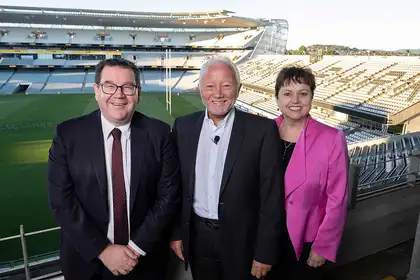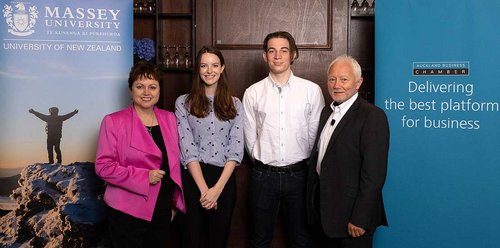
Finance Minister Grant Robertson with chief executive of the Auckland Business Chamber Michael Barnett and Massey University Vice-Chancellor Professor Jan Thomas. Pictured at Eden Park for Finance 2019, the 11th annual event hosting New Zealand's Minister of Finance.
Finance Minister Grant Robertson gave a wide-reaching speech on the factors impacting the New Zealand economy at Finance 2019 this morning, but there was only one subject guests wanted to ask him about.
The hot topic at the annual event, which is co-hosted by Massey University and the Auckland Business Chamber, was the capital gains tax (CGT) proposed by the Tax Working Group.
Mr Robertson talked about macroeconomic issues, including Brexit and the trade tensions between the United States and China, as well as New Zealand’s strong economic fundamentals, institutional reform of the Reserve Bank and the five priorities in the government’s upcoming “wellbeing” Budget.
But the post-speech Q&A session, facilitated by Auckland Business Chamber chief executive Michael Barnett, was dominated by the capital tax gains tax proposals.
No final decisions about a CGT yet
Mr Robertson stressed the government has not made any final decisions about a CGT and said he believed they had delivered the report they were asked to – a balanced and fair tax system, fit for the middle of the 21st century.
“What they came back and told us was, by and large, the New Zealand tax system works well,” he said. “But they identified gaps in those criteria around fairness and balance and they proposed a set of changes to deal with that. We are not bound to take up all their recommendations.
“We now have the job to work through them to see what we think will add to fairness and, being frank, what is possible to gain consensus on in a Coalition government.”
He asked the audience to remember that a capital gains tax would only come into play once an asset was sold and the regime would be prospective, not retrospective.
“It’s about gains made in the future, not about gains made up until now. I don’t think those two factors have been highlighted enough in the past few days.”
Mr Robertson also worked to reassure the business community their interests would be well considered.
“We also want to ensure we remain a productive and innovative economy,” he said. “As the prime minister herself said yesterday at her post-Cabinet press conference, small business is top of her mind as we work through these proposals.”

Professor Jan Thomas and Michael Barnett present top student scholarships to Stephanie Blackwell and Benjamin Marmont.
Student award winners
Massey University Vice-Chancellor Professor Jan Thomas acknowledged the Government’s many challenges but also expressed her belief there was “cause for great optimism”. She also outlined the examples of Massey researchers partnering with industry to progress great ideas into commercial products.
“Businesses rightfully claim that universities can be challenging to work with,” she said. “At Massey, we are working hard to change that. I want our researchers and students to be seen as valuable and sought-after partners.”
Some of the profits from Finance 2019 go to supporting promising economics and finance students at Massey University. This year, Professor Thomas and Mr Barnett presented $1000 scholarships to top first-year economics student Benjamin Marmont and top first-year finance student Stephanie Blackwell.